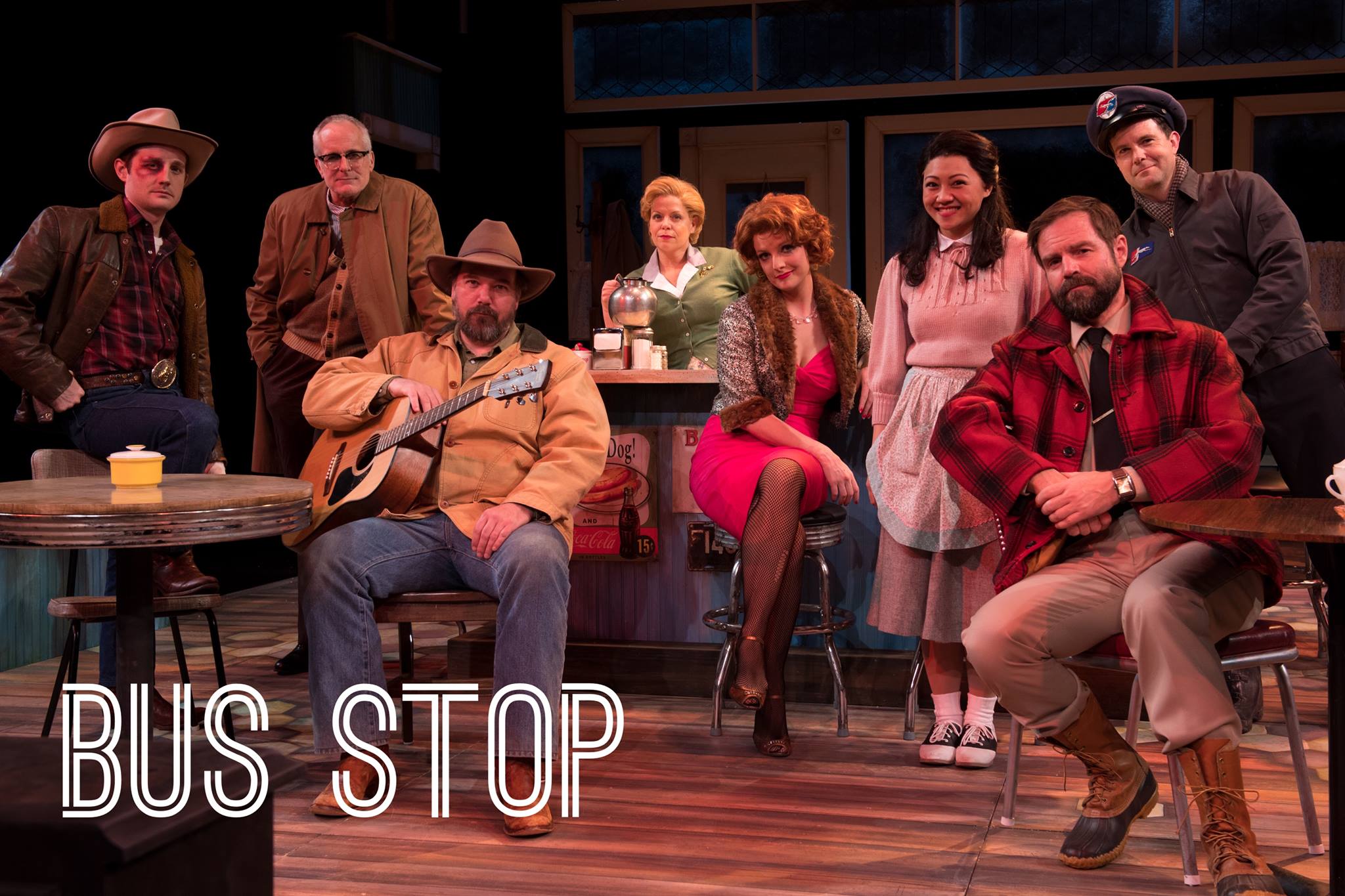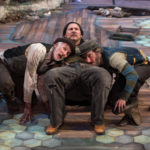
Review: Arvada Center’s ‘Bus Stop’ a beguiling and nostalgic drama of America’s heartland
While the Denver Center Theatre Company seems to be undergoing some kind of shakedown, the Arvada Center’s Black Box Theatre continues to assert itself as the pre-eminent producer of outstanding classical plays by a resident professional ensemble. The current production of Pulitzer Prize-winning playwright William Inge’s poignant and tender Chekhovian drama Bus Stop, playing through April 15, is a triumph of design, direction, and execution.
Things aren’t always simple in affairs of the heart, and the motley gathering of American Heartlanders stranded in a Kansas diner during a blizzard in 1955 spend the evening revealing, often reluctantly, their hearts’ desires, painful longings, frustrations, hopes, and remorse.
It’s 1 a.m. At Gracie’s Diner, thirty miles west of Kansas City, and the snow is piling up outside. Grace (Kate Gleason) wants to close up for the night and retire to her upstairs apartment. Her bright and tireless teenage waitress Elma (Jenna Moll Reyes) offers to help, when they learn from world-wise and not-too-weary sheriff Will (Geoffrey Kent) that the last bus coming through that night can’t go on to Topeka until the road is cleared.
The bus pulls in, carrying the flirtatious driver Carl (Josh Robinson), reprobate and alcoholic professor Dr. Lyman (Sam Gregory), the harried 19-year-old-but-fading chanteuse Cherie (Emily Van Fleet), and a couple of rodeo cowboys, easy-going Virgil (Michael Morgan) and the boastful, hot-headed Bo Decker (Sean Scrutchins) who carries a chip on his shoulder as big as a Montana sky.
Most of the pyrotechnics happen between Bo and Cherie, as he won’t be dissuaded from marrying the singer, and dragging her off to his ranch, caveman style. She isn’t sure where to go or what to do, other than to run like a frightened little filly.
The sheriff and Bo get into a dust up when the cocky youth refuses to back down and act respectfully. There’s a more subtle mutual seduction going on between Carl and Grace. Dr. Lyman finds his attraction to the under-aged Elma and her innocent responses to his poetic musings a little too beguiling for his own good.
Director Allison Watrous has assembled a top-notch cast of seasoned, classically trained, and seriously talented actors for this production. I suspect that together they examined Inge’s densely-layered script for every possible nuance, every character revelation and insight, then arranged for the audience to share their discoveries to maximum effect. Snow may cover the ground outside the diner, but every heart is painstakingly exposed in a world where love, compassion, humility, understanding, sacrifice, succor, and just plain human goodness still hold sway.
Scrutchins and Van Fleet have all the chemistry needed to set off the fireworks in Bo and Cherie’s incendiary relationship. The painful but necessary taming of the wild mustang Bo symbolizes is entirely credible.
Gregory’s Lyman, potentially the least sympathetic character, is filled with pathos, self-loathing and regret. Though fallen low, he strives for the high road. The moment in which he recites Romeo’s balcony scene speech is absolutely electrifying.
Morgan, as Bo’s even-tempered father figure, though often relegated to the background or providing guitar accompaniment, has the power to either warm our hearts or break them, and accomplishes both.
Reyes’ Elma is almost impossibly upbeat and innocent, but she too experiences an awakening that moves her closer to womanhood. Gleason and Robinson are hilarious in their attempts to keep their affair secret, yet there’s a hint of a darker side to their philandering.
As the peacekeeper, Kent is especially strong in the effortless way of men who have taken beatings in the past, won more fights than lost, and now have nothing to prove. If a body needs a nudge to get back on the straight and narrow or just grow up, he’s the man to step up and do what needs doing.
Brian Mallgrave’s hyper-realistic scenic design is a marvel, from the falling snow to the inlaid wood floor, to the donuts under glass. It hearkens to an Americana at its most nostalgic, after the war but before the revolutionary Sixties.
There’s something inherently dramatic about gathering a bunch of colorful characters, putting them in a room together, and seeing what happens. It sounds simple, but Inge was a master. Now, the master craftsmen and performing artists at the Arvada Center have brought this compelling example of great American Realism to its full potential.



